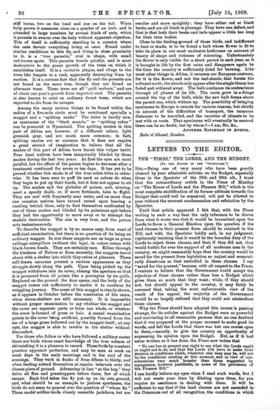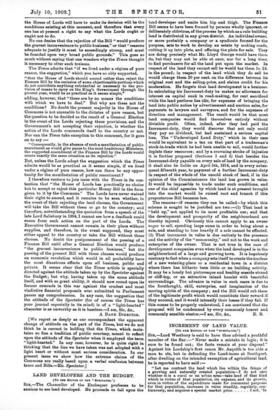LETTERS TO THE EDITOR.
TEE "TIMES," THE LORDS, AND THE BUDGET.
[To THE ROMS Or SKS "SPRCTATOL1
Sin,—Being one of very many who have been greatly cheered by your admirable articles on the Budget, especially those in the Spectator of the 19th and 26th ult., I trust that the extraordinary article in the Times of Monday on "The House of Lords and the Finance Bill," which is the ' most complete stultification of its former attitude towards the Budget that could well be conceived, will not be allowed to pass without the severest condemnation and refutation by the Spectator.
Until that article appeared I felt that, with the Times writing in such a way that the only inference to be drawn from what it wrote was that it would be incumbent upon the Lords to force a General Election upon the question if the land clauses in their present form should be retained in the Bill, and with the Spectator boldly and, in my judgment, righteously insisting that it would be the bounden duty of the Lords to reject these clauses, and that, if they did not, they would forfeit for ever the support of all moderate men in the country, we might reasonably hope that the country would be saved for the present from legislation so unjust and economi- cally disastrous as that embodied in these clauses. I say "saved for the present," because, with all respect to the Times, I venture to believe that the Government would accept the rejection of these clauses rather than lose a Budget which gives them so much that they want; while. if they should not, but should appeal to the country, it may fairly be assumed that, taking the most unfavourable view of the result of the appeal, the majority of the Government would be so largely reduced that they could not reintroduce these clauses.
Why the Times should have adopted this course is passing strange, for its articles against the Budget were so powerful and convincing to all reasonable persons that no one doubted that it was prepared at the proper moment to make good its words, and tell the Lords that there was but one course open to them,—namely, to give the country an opportunity of expressing its opinion upon the Budget. But, as if it had never written as it has done, the Times now writes that "No one has at present any right to say what the Lords ought or ought not to do, and that the Lords will have to make their' decision in conditions which, whatever else they may be, will not be the conditions existing at this moment, and in view of con- siderations very much broader than those suggested by repugnance, however justifiable, to some of the provisions of the Finance Bill."
I can hardly believe thy eyes when I read such words, but I will not waste your time by dilating upon them, for you require no assistance in dealing with them. It will be sufficient to say that if the land clauses are not amended in • the Commons out of all recognition, the conditions in which
the House of Lords will have to make its decision will be the conditions existing at this moment, and therefore that every one has at present a right to say what the Lords ought or ought not to do.
No one denies that the rejection of the Bill " would produce the gravest inconvenience to public business," or that " reasons adequate to justify it must be exceedingly strong, and must be founded upon very broad public grounds." This goes so much without saying that one wonders why the Times thought it necessary to utter such truisms.
The Times admits that "if we lived under a regime of pure reason, the suggestion," which you have so ably supported, "that the House of Lords should amend rather than reject the Finance Bill by the omission of some objectionable portions which do not contribute anything substantial or necessary to the pro- vision of means to carry on the King's Government through the present year, would be as practical as it seems simple,* adding, however, that "these are by no means the conditions with which we have to deal." But why are these not the conditions ? No doubt the present majority; in the House of Commons is not amenable to the dictates of pure reason, but the question to be decided as the result of a General Election in the event of the Lords rejecting these provisions, and the Government's not accepting their rejection, is whether the action of the Lords commends itself to the country or not. Nor can the Times take exception to this comment, for it goes on to say :—
" Consequently, in the absence of such a manifestation of public resentment as would give pause to the most headstrong Ministers, the suggested amendment of the Finance Bill by the Lords would create exactly the same situation as its rejection."
But, unless the Lords adopt the suggestion which the Times admits would be as practical as it seems simple, if we lived under a regime of pure reason, how can there be any oppor- tunity for the manifestation of public resentment ?
I therefore venture to join issue with the Times in its con- tention that "the House of Lords has practically no choice but to accept or reject this particular Money Bill in the form given to it by the Commons." The Lords have never waived their right to amend, and it remains to be seen whether, in the event of their rejecting the land clauses, the Government will take the Bill without them or go to the country ; and therefore, notwithstanding the quotation from a speech of the late Lord Salisbury in 1894,1 cannot see how a deadlock could ensue from such action on the part of the Lords. The Executive Government cannot remain in their place without supplies, and therefore, in the event supposed, they must either appeal to the country or take the Bill without these clauses. No doubt the postponement of the passing of a Finance Bill until after a General Election would produce "the gravest inconvenience to public business," but the passing of the present Bill with these clauses would produce an economic revolution which would in all probability have the most disastrous effects upon all business, public and private. It seems clear that the Times article is specially directed against the attitude taken up by the Spectator against the Budget ; but why, having taken up the same attitude itself, and with as great ability, it should now round upon its
former comrade in this war against the crudest and most vindictive financial proposals ever submitted to Parliament passes my comprehension. In any case, the suggestion that the attitude of the Spectator (for of course the Times has your journal especially in its mind) is of a "light-hearted" character is as unworthy as it is baseless.—I am, Sir, &ea A BANK DIRECTOR.
[We regret as deeply as our correspondent the apparent change of attitude on the part of the Times, but we do not think he is correct in holding that the Times, which main- tains so fine a tradition of public courtesy, meant to reflect upon the attitude of the Spectator when it employed the term "light-hearted." In any case, however, he is quite right in thinking that the line we have taken was net adopted with a light heart or without most serious consideration. In our present issue we show how the extreme claims of the Commons are really based upon a verbal confusion between taxes and Bills.—En. Spectator.]











































 Previous page
Previous page